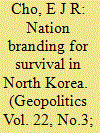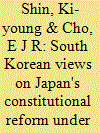| Srl | Item |
| 1 |
ID:
155458


|
|
|
|
|
| Summary/Abstract |
The article problematises a popular view in nation branding literature that equates nation branding with states’ attendant advertising campaigns. Instead, this article adopts a broader perspective that nation branding can also operate as a policy aimed at enhancing the sense of ontological security among states and as a practice to strengthen the position of the ruling regime by targeting particular audiences within a broader ‘strategic narrative’. From this perspective, this article aims to shed new light on non-liberal capitalist countries’ – specifically North Korea’s – attempts at nation branding policies in terms of various nation branding strategies. In so doing, Clifford Geertz’s anthropological concept of ‘theatre state’ is introduced as an important metaphor to broaden the existing understanding of nation branding by highlighting the unique characteristics of North Korea’s policies of nation branding and nation building. It is argued that great national spectacles such as the Arirang Festival and military demonstrations provide North Korea with a useful platform for participating in the identity competition among other nation states, as well as in the fierce recognition game against the rest of the Korean national community. Obviously, these strategic performances have contributed to communicating with the outside world, deliberately seeking more respect from others, but have simultaneously operated as nation building processes. Therefore, this work concludes that such staged events are sophisticatedly designed to enhance North Korea’s complex interest of nation branding, and, more importantly, argues that techniques and practices of nation branding are neither historically new nor confined to Western liberal capitalist regimes.
|
|
|
|
|
|
|
|
|
|
|
|
|
|
|
|
| 2 |
ID:
157818


|
|
|
|
|
| Summary/Abstract |
In this Special Section, this article reviews South Korean views on Japan's ‘peace’ Constitution and the Abe government's attempts at constitutional reform. It identifies three different understandings among South Korean academics on why Japan is escalating attempts to revise the Constitution under the Abe government. An in-depth analysis demonstrates that all three perspectives pay specific attention to Japan's constitutional reform in relation to security policy changes. However, they differ in assessing the impact of Japan's constitutional reform on South Korea as well as how South Korea should deal with such a change. A minority opinion considers Japan's ‘remilitarisation’ through constitutional revision as conducive to South Korean security interests by increasing deterrence against North Korea, whereas the dominant opinion is that any attempt to revise the Constitution could be in and of itself a potential threat to South Korea's security due to a lack of trust attributed to unresolved historical conflicts between Korea and Japan. However, all three approaches pay hardly any attention to the positive role of Japan's peace Constitution while Japan's peace Constitution might provide a regional peace model in Northeast Asia.
|
|
|
|
|
|
|
|
|
|
|
|
|
|
|
|